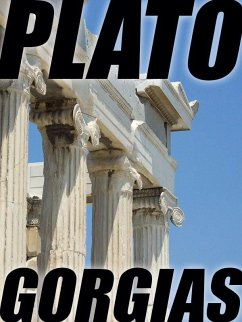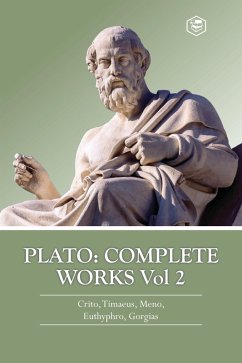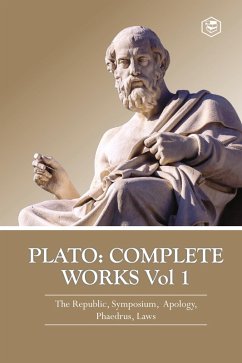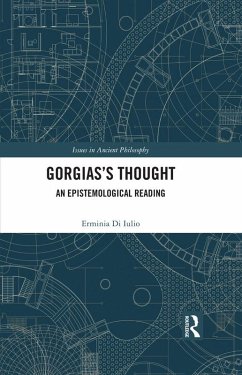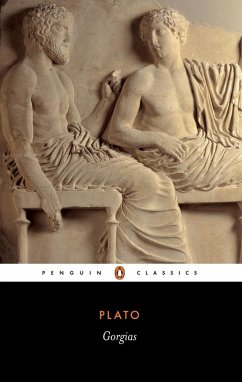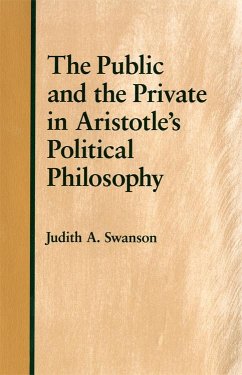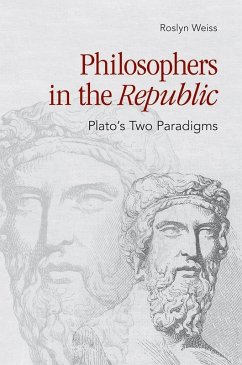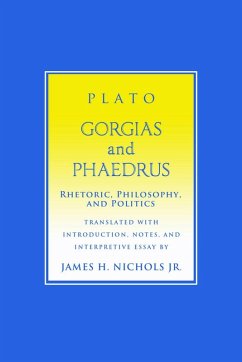
"Gorgias" and "Phaedrus" (eBook, ePUB)
Rhetoric, Philosophy, and Politics
Übersetzer: Nichols, James H.

PAYBACK Punkte
13 °P sammeln!
With a masterful sense of the place of rhetoric in both thought and practice and an ear attuned to the clarity, natural simplicity, and charm of Plato's Greek prose, James H. Nichols Jr., offers precise yet unusually readable translations of two great Platonic dialogues on rhetoric.The Gorgias presents an intransigent argument that justice is superior to injustice: To the extent that suffering an injustice is preferable to committing an unjust act. The dialogue contains some of Plato's most significant and famous discussions of major political themes, and focuses dramatically and with unrivale...
With a masterful sense of the place of rhetoric in both thought and practice and an ear attuned to the clarity, natural simplicity, and charm of Plato's Greek prose, James H. Nichols Jr., offers precise yet unusually readable translations of two great Platonic dialogues on rhetoric.
The Gorgias presents an intransigent argument that justice is superior to injustice: To the extent that suffering an injustice is preferable to committing an unjust act. The dialogue contains some of Plato's most significant and famous discussions of major political themes, and focuses dramatically and with unrivaled intensity on Socrates as a political thinker and actor. Featuring some of Plato's most soaringly lyrical passages, the Phaedrus investigates the soul's erotic longing and its relationship to the whole cosmos, as well as inquiring into the nature of rhetoric and the problem of writing.
Nichols's attention to dramatic detail brings the dialogues to life. Plato's striking variety in conversational address (names and various terms of relative warmth and coolness) is carefully reproduced, as is alteration in tone and implication even in the short responses. The translations render references to the gods accurately and non-monotheistically for the first time, and include a fascinating variety of oaths and invocations. A general introduction on rhetoric from the Greeks to the present shows the problematic relation of rhetoric to philosophy and politics, states the themes that unite the two dialogues, and outlines interpretive suggestions that are then developed more fully for each dialogue.
The twin dialogues reveal both the private and the political rhetoric emphatic in Plato's philosophy, yet often ignored in commentaries on it. Nichols believes that Plato's thought on rhetoric has been largely misunderstood, and he uses his translations as an opportunity to reconstruct the classical position on right relations between thought and public activity.
The Gorgias presents an intransigent argument that justice is superior to injustice: To the extent that suffering an injustice is preferable to committing an unjust act. The dialogue contains some of Plato's most significant and famous discussions of major political themes, and focuses dramatically and with unrivaled intensity on Socrates as a political thinker and actor. Featuring some of Plato's most soaringly lyrical passages, the Phaedrus investigates the soul's erotic longing and its relationship to the whole cosmos, as well as inquiring into the nature of rhetoric and the problem of writing.
Nichols's attention to dramatic detail brings the dialogues to life. Plato's striking variety in conversational address (names and various terms of relative warmth and coolness) is carefully reproduced, as is alteration in tone and implication even in the short responses. The translations render references to the gods accurately and non-monotheistically for the first time, and include a fascinating variety of oaths and invocations. A general introduction on rhetoric from the Greeks to the present shows the problematic relation of rhetoric to philosophy and politics, states the themes that unite the two dialogues, and outlines interpretive suggestions that are then developed more fully for each dialogue.
The twin dialogues reveal both the private and the political rhetoric emphatic in Plato's philosophy, yet often ignored in commentaries on it. Nichols believes that Plato's thought on rhetoric has been largely misunderstood, and he uses his translations as an opportunity to reconstruct the classical position on right relations between thought and public activity.
Dieser Download kann aus rechtlichen Gründen nur mit Rechnungsadresse in A, D ausgeliefert werden.





